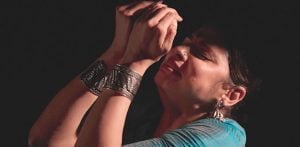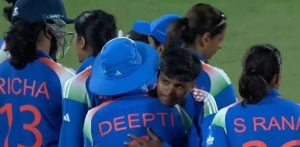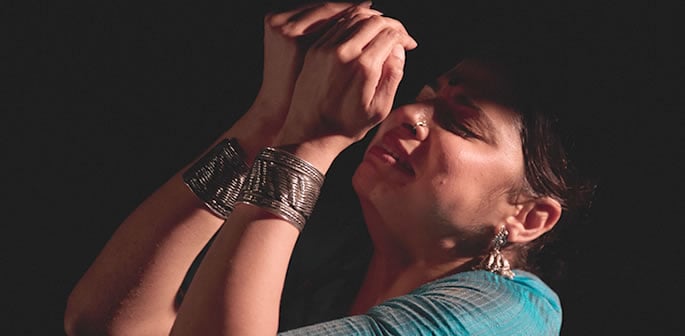“It wasn’t love at first sight."
Newcastle-based dancer and choreographer Payal Ramchandani is using Kuchipudi, the South Indian classical dance form, to tell stories that are rarely spoken aloud.
With its fluid movements, rhythmic footwork, and expressive storytelling, Kuchipudi becomes a language in her hands, capable of conveying grief, joy, and the delicate tensions of human experience.
Her latest work, Just Enough Madness, explores the silences surrounding motherhood, miscarriage, and mental health, blending poetic text, ritual, and live music to confront the spaces between presence and absence.
Performing alongside live musicians, Payal brings classical technique into dialogue with contemporary themes, inviting audiences to reflect on what is lost, what is carried, and what can be reclaimed.
As one of the few Kuchipudi artists active in the UK, she is at the forefront of making this ancient form resonate with modern audiences.
In an exclusive interview with DESIblitz, Payal Ramchandani opened up about her journey and her work.
Discovering the Language of Kuchipudi
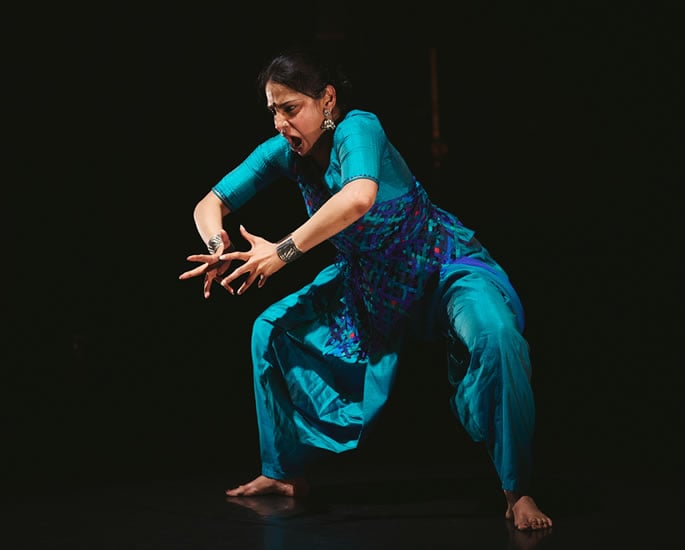
Payal Ramchandani’s relationship with Kuchipudi began long before she fully understood it.
She says: “It wasn’t love at first sight. I was far too young to understand what I was learning.
“I was all of four when I began, simply following instructions without grasping the depth of the form.”
Over the years, however, the dance revealed its richness layer by layer.
“What keeps me drawn to it even now is its innate sense of duality – it carries grace and power, restraint and abandon, all in the same breath.
“It’s deeply rooted in storytelling, yet fluid enough to let imagination thrive.”
Payal describes the form as a language capable of expressing the full spectrum of human experience, combining theatricality with personal expression in ways that continue to captivate her.
Navigating Tradition & Modernity in the UK
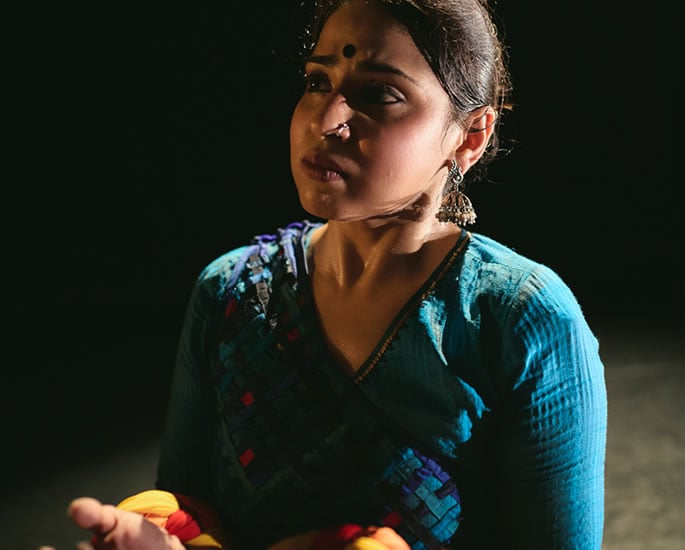
Relocating to the UK presented both challenges and opportunities for Payal Ramchandani, as she explains:
“When I moved to the UK, I found myself navigating two worlds – one deeply rooted in tradition, and another that invited me to use the form to engage in dialogue with audiences about contemporary experiences, social dichotomies, and practices.”
Her practice evolved into a dynamic exchange between the classical and the contemporary:
“The UK’s dance ecology has given me the space to hold these questions, allowing Kuchipudi to thrive as a living, responsive form that speaks to our shared human complexities.”
In this way, her choreography reflects not only her personal journey but also a broader conversation about how traditional forms can resonate with modern audiences.
Exploring Motherhood through Movement
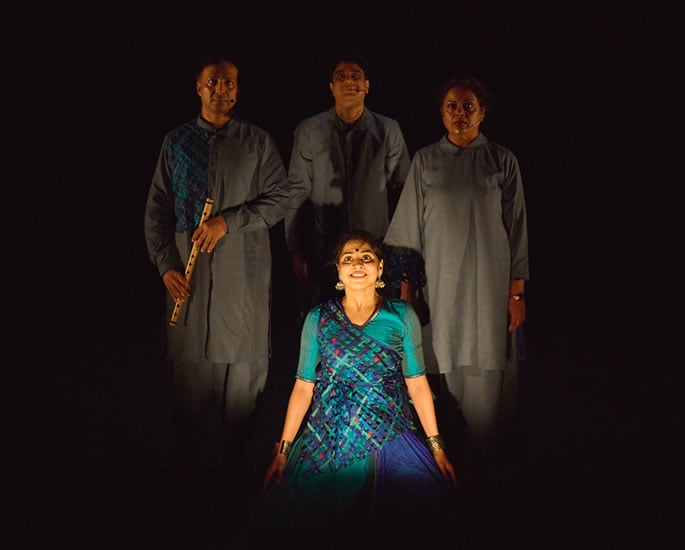
Payal Ramchandani’s latest work, Just Enough Madness, emerged from a deeply inquisitive and empathetic place.
She says: “Much like my other works, Just Enough Madness was born out of curiosity, a need to understand the complex journey of motherhood and all that it entails: its unspoken truths, expectations, the becoming and the unbecoming.”
The piece developed through conversations with women, capturing experiences of grief, identity, and expectation.
The most challenging section was one confronting miscarriage.
Payal elaborates:
“It demanded a kind of vulnerability that goes beyond physical performance.”
“It required me to inhabit absence, to dance the emptiness that follows, and to ask what it means to become an ‘almost’ mother.
“It meant walking with the invisible weight of guilt (despite not being at fault) and carrying the ache of expectation and craving.”
Payal Ramchandani’s choreography channels her own reflections alongside those of others, creating work that resonates universally.
Looking Ahead: Art as Inquiry
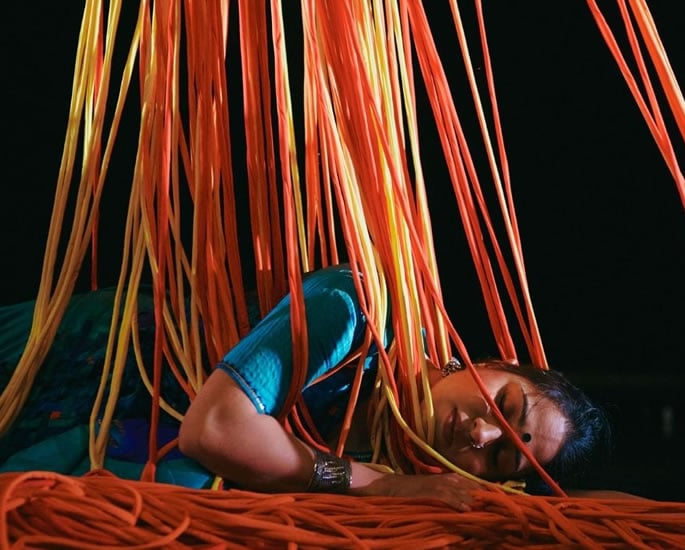
For Payal Ramchandani, art is both a mirror and a compass.
“Every phase of my own life has found its way into this work in terms of my encounters with grief, recovery, and rediscovery.
“Although I haven’t been on the journey of motherhood myself, I’m at an age and stage where I find myself deeply drawn to its questions – what it means to create, to nurture, to lose, and to rebuild.”
She hopes her work encourages dialogue: “I hope it invites people to see motherhood not as a singular narrative of fulfilment, but as a complex, evolving journey of ‘becoming and unbecoming’.”
Payal also shares advice for emerging South Asian artists: “The work we do has a way of revealing who we are, and that, in itself, is such a joy to experience… to stay curious, stay rooted, and keep creating from a place of honesty and openness.”
Looking forward, she is exploring themes of caste, systemic bias, and ritual in a new project, alongside a longer tour of Just Enough Madness, demonstrating her commitment to evolving her art while remaining grounded in its expressive power.
Through Just Enough Madness, Payal Ramchandani demonstrates how a classical form like Kuchipudi can engage with urgent, contemporary narratives without losing its roots.
Her choreography navigates tradition and experimentation, personal reflection and universal experience, transforming dance into a space where grief, resilience, and curiosity coexist.
By addressing themes of motherhood, loss, and identity, she not only brings classical Indian dance to new audiences in the UK but also opens a dialogue about emotions and experiences that are often silenced.
Payal’s ongoing work shows that Kuchipudi is not static; it is a living, evolving language capable of expressing the full spectrum of human complexity.
In doing so, she continues to carve out a vital space for classical dance to remain relevant, resonant, and profoundly human.
Just Enough Madness premieres at Newcastle’s Dance City on November 22, 2025. Additional performances will be at Bradford Arts Centre and The Lowry on March 26 and 31, respectively.
































